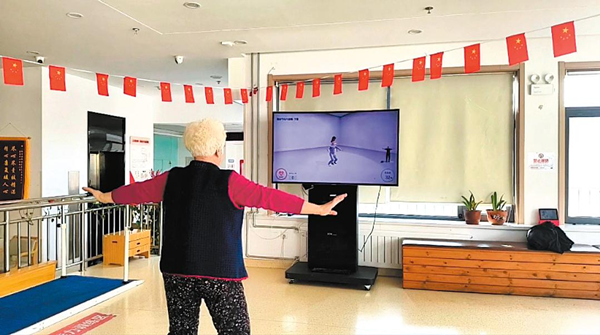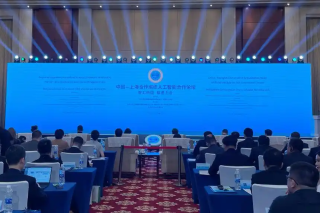Smart elderly care changing twilight years for the better

Following the instructions on a screen, an elderly lady exercises at the Yuexiu Road Elderly Care Service Center in Tianjin. CHINA DAILY
An innovative elderly care center in Tianjin's Hexi district is offering a glimpse into the future of aging in China, combining artificial intelligence with community-based services to improve the lives of older residents.
At the Yuexiu Road Elderly Care Service Center, technology is quietly reshaping daily routines. Seniors rest on smart mattresses that monitor heart rate and breathing in real time, allowing early detection of health issues. These smart mattresses have become the "invisible guardians" of elderly health management in the center's care beds.
"Through data collection and analysis, the mattresses can provide a scientific basis for each senior's health records, precise prediction of health risks, and interventions," said Zhan Hengbo, vice-president of the Tianjin Elderly Industry Association and head of the center's research and development company.
As elderly care increasingly becomes a focal point of social attention, Zhan's team has been focusing on home-based and community-based elderly care research for over 10 years.
According to data from the Ministry of Civil Affairs, by the end of 2024, China's population aged 60 and above reached 310 million, accounting for 22 percent of the total population. The number of elderly in China is close to the total population of the United States.
As of the end of 2023, Tianjin had 3.4 million elderly residents aged 60 and above, accounting for nearly 25 percent of its population, according to the local government.
"With the emergence of various new technologies like artificial intelligence, new opportunities have arisen for home-based elderly care, such as the use of smart devices and real-time data networking, enabling seniors to potentially break free from manual care and achieve home-based care," he said.
Wu Hao, deputy director of the elderly care service center in Hexi district, mentioned that a family companion desktop robot has been operational in thousands of households, enabling elderly individuals who are apprehensive about new technology to effectively utilize it.
At home, seniors only need to call out "Xiao Xin", and the robot can assist them with tasks like ordering meals, making medical appointments, and scheduling community activities. Community staff would promptly respond to related needs.
In November, an elderly woman surnamed Cai was diagnosed with a stroke and diabetes, making it challenging for her and her spouse to care for each other.
"At that time, the staff at the care center introduced us to a special program called 'One-Stop Butler Service', which includes intelligent service robots and a dedicated butler. Now, I use the robot every day, and butler Meng Meng is like my family member," Cai said.
With Meng's guidance, Cai enjoys playing her favorite old songs using the robot.

Copyright ©
Tianjin Municipal Government. All rights reserved. Presented by China Daily.
京ICP备13028878号-35



